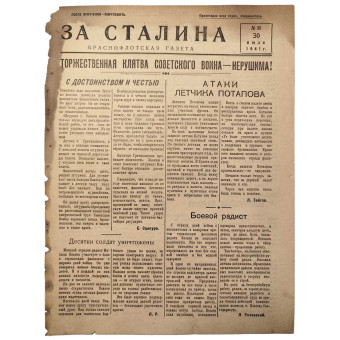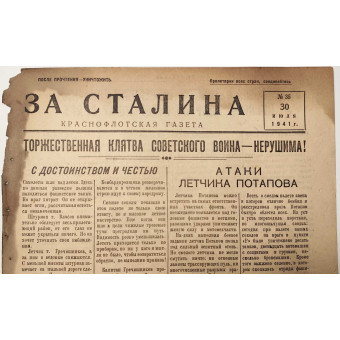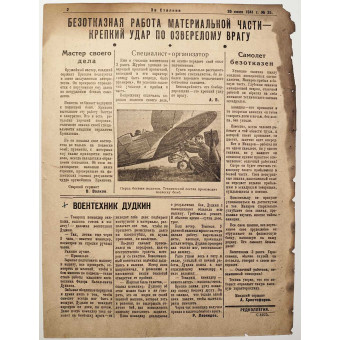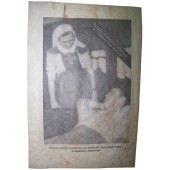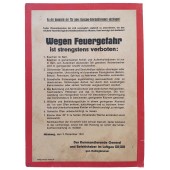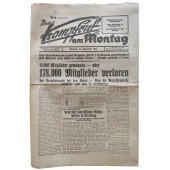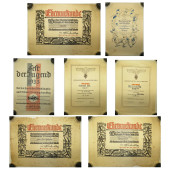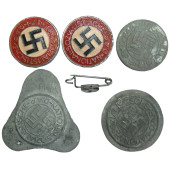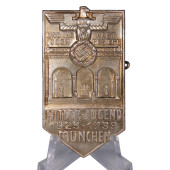Soviet naval newspaper "For Stalin", July 30, 1941
Destroy after reading. A scarce newspaper, the last survived example.
FOR STALIN
KRASNOFLOTSKAYA NEWSPAPER
No. 35
July 30, 1941
FLAWLESS OPERATION OF TECHNICAL EQUIPMENT – A POWERFUL BLOW TO THE RUTHLESS ENEMY
Master of His Craft
Armorer Junior Sergeant Ermilov is highly respected in his unit. He efficiently fulfills his duties in arming combat aircraft.
There is never a delay in bomb mounting. Ermilov performs this task quickly and accurately. This is a result of his skill, experience, and deep knowledge of his specialty.
But he has shown his mastery not only in handling bombs; the machine guns he works with are always kept in perfect condition.
Our gunners have spoken clearly about this after testing Ermilov’s work on the heads of the fascists.
Senior Sergeant V. Volkov.
Specialist-Organizer
Even back in the Kyiv Military Technical School, Yakubik developed a crucial habit: to always be ahead, to be a specialist, and to combine his expertise with the training of subordinates.
He confidently passes on the critical tasks of his trade to his subordinates.
He knows how to properly position specialists, ensure the best technical maintenance of aircraft, and organize his team effectively.
All of this is vital in battle, and well-structured training is a powerful strike against the enemy.
A. V.
The Aircraft Never Fails
After successfully completing the junior aviation specialists’ school, Makarov arrived at his combat unit. With his deep knowledge of aviation theory and excellent work ethic, he quickly caught the attention of the squadron’s technical staff.
Aviation is his calling, and he is ready to discuss it day and night, tirelessly, without end.
It is well known that when a person works in a field that he is passionate about, he moves forward.
Makarov, working on a single aircraft, on a single piece of equipment, realized that aviation is not just routine maintenance:
Soon, he will take pride in his service in the combat unit. His exceptional knowledge and accumulated experience are now being shared with newly arrived comrades who need guidance.
A true Komsomol member does not rest on his achievements, and Comrade Makarov diligently deepens his knowledge, continuing to uncover the many secrets of aviation.
He directs all his knowledge and relentless diligence against the fascist horde, crushing them into the soil of his Motherland. His aircraft is always combat-ready!
Technical Officer 2nd Rank Gerasimenya, known for his reserved praise, speaks highly of him:
"An outstanding worker, an irreplaceable assistant!"
The technical unit values his work, repeatedly recognizing his high professionalism.
Junior Sergeant A. Khristoforov.
Military Technician Dudkin
— Comrade squadron commander, the aircraft is ready for departure! — reported military technician Dudkin.
— We take off in three hours, — the commander noted, glancing at his watch.
— Earlier is better.
— Correct…
Preparing the aircraft for flight in advance, checking every detail to ensure the machine will not fail in battle—this is the work ethic of Junior Military Technician Fyodor Vasilievich Dudkin.
Skipping meal breaks and thinking only about keeping the aircraft ready for action, Dudkin never leaves the airfield, day or night.
Even when the commander takes the aircraft on a bombing mission against the enemy, he finds work to do: selecting tools and materials, arranging everything so that there is no need to search for pliers, wire, or rivets at the last moment.
Recently, an aircraft landed at the airfield with an unusual rumbling motor and a high-pitched whistling sound. The concerned technician rushed to inspect it.
The engine was clearly malfunctioning, and the fuselage and wings bore gaping holes from enemy fire.
— It was a fierce battle, — the commander said.
But Dudkin didn’t need to be told; he could see it on his "green machine," which, despite being damaged, had held up exceptionally well, allowing the crew to complete their mission.
While the commander reported on the battle’s outcome, Dudkin and his assistants thoroughly inspected the aircraft. Repairs were necessary. Under normal circumstances, it would take two or three days.
Evening fell. The skilled hands of the technicians began their work: cutting patches, riveting, and cleaning engine components.
Dudkin checked everything as thoroughly as possible, restoring the aircraft.
By early morning, drenched in sweat and oil, exhausted from a night of labor, Dudkin quietly approached the resting commander and reported:
— Comrade commander, you may take off—the aircraft is ready.
The commander firmly shook his comrade’s hand. He had not expected that just one night would be enough to repair the aircraft’s wounds.
An hour later, the commander received his orders and took off to bomb the enemy.
R. Leonidov.
Destroy after reading. A scarce newspaper, the last survived example.
FOR STALIN
KRASNOFLOTSKAYA NEWSPAPER
No. 35
July 30, 1941
FLAWLESS OPERATION OF TECHNICAL EQUIPMENT – A POWERFUL BLOW TO THE RUTHLESS ENEMY
Master of His Craft
Armorer Junior Sergeant Ermilov is highly respected in his unit. He efficiently fulfills his duties in arming combat aircraft.
There is never a delay in bomb mounting. Ermilov performs this task quickly and accurately. This is a result of his skill, experience, and deep knowledge of his specialty.
But he has shown his mastery not only in handling bombs; the machine guns he works with are always kept in perfect condition.
Our gunners have spoken clearly about this after testing Ermilov’s work on the heads of the fascists.
Senior Sergeant V. Volkov.
Specialist-Organizer
Even back in the Kyiv Military Technical School, Yakubik developed a crucial habit: to always be ahead, to be a specialist, and to combine his expertise with the training of subordinates.
He confidently passes on the critical tasks of his trade to his subordinates.
He knows how to properly position specialists, ensure the best technical maintenance of aircraft, and organize his team effectively.
All of this is vital in battle, and well-structured training is a powerful strike against the enemy.
A. V.
The Aircraft Never Fails
After successfully completing the junior aviation specialists’ school, Makarov arrived at his combat unit. With his deep knowledge of aviation theory and excellent work ethic, he quickly caught the attention of the squadron’s technical staff.
Aviation is his calling, and he is ready to discuss it day and night, tirelessly, without end.
It is well known that when a person works in a field that he is passionate about, he moves forward.
Makarov, working on a single aircraft, on a single piece of equipment, realized that aviation is not just routine maintenance:
Soon, he will take pride in his service in the combat unit. His exceptional knowledge and accumulated experience are now being shared with newly arrived comrades who need guidance.
A true Komsomol member does not rest on his achievements, and Comrade Makarov diligently deepens his knowledge, continuing to uncover the many secrets of aviation.
He directs all his knowledge and relentless diligence against the fascist horde, crushing them into the soil of his Motherland. His aircraft is always combat-ready!
Technical Officer 2nd Rank Gerasimenya, known for his reserved praise, speaks highly of him:
"An outstanding worker, an irreplaceable assistant!"
The technical unit values his work, repeatedly recognizing his high professionalism.
Junior Sergeant A. Khristoforov.
Military Technician Dudkin
— Comrade squadron commander, the aircraft is ready for departure! — reported military technician Dudkin.
— We take off in three hours, — the commander noted, glancing at his watch.
— Earlier is better.
— Correct…
Preparing the aircraft for flight in advance, checking every detail to ensure the machine will not fail in battle—this is the work ethic of Junior Military Technician Fyodor Vasilievich Dudkin.
Skipping meal breaks and thinking only about keeping the aircraft ready for action, Dudkin never leaves the airfield, day or night.
Even when the commander takes the aircraft on a bombing mission against the enemy, he finds work to do: selecting tools and materials, arranging everything so that there is no need to search for pliers, wire, or rivets at the last moment.
Recently, an aircraft landed at the airfield with an unusual rumbling motor and a high-pitched whistling sound. The concerned technician rushed to inspect it.
The engine was clearly malfunctioning, and the fuselage and wings bore gaping holes from enemy fire.
— It was a fierce battle, — the commander said.
But Dudkin didn’t need to be told; he could see it on his "green machine," which, despite being damaged, had held up exceptionally well, allowing the crew to complete their mission.
While the commander reported on the battle’s outcome, Dudkin and his assistants thoroughly inspected the aircraft. Repairs were necessary. Under normal circumstances, it would take two or three days.
Evening fell. The skilled hands of the technicians began their work: cutting patches, riveting, and cleaning engine components.
Dudkin checked everything as thoroughly as possible, restoring the aircraft.
By early morning, drenched in sweat and oil, exhausted from a night of labor, Dudkin quietly approached the resting commander and reported:
— Comrade commander, you may take off—the aircraft is ready.
The commander firmly shook his comrade’s hand. He had not expected that just one night would be enough to repair the aircraft’s wounds.
An hour later, the commander received his orders and took off to bomb the enemy.
R. Leonidov.


